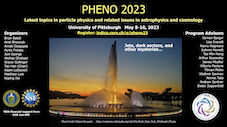Speaker
Description
Nuclear scattering events with large momentum transfer in atomic, molecular, or solid-state systems may result in electronic excitations. In the context of atomic scattering by dark matter (DM), this is known as the Migdal effect, but the same effect has also been studied in molecules in the chemistry and neutron scattering literature. Here we present two distinct Migdal-like effects from DM scattering in molecules, which we collectively refer to as the molecular Migdal effect: a center-of-mass recoil, equivalent to the standard Migdal treatment, and a non-adiabatic coupling resulting from corrections to the Born-Oppenheimer approximation. The molecular bonds break spherical symmetry, leading to large daily modulation in the Migdal rate from anisotropies in the matrix elements. Our treatment reduces to the standard Migdal effect in atomic systems but does not rely on the impulse approximation or any semiclassical treatments of nuclear motion, and as such may be extended to models where DM scatters through a long-range force. We demonstrate all of these features in a few simple toy models of diatomic molecules, namely ${\rm H}_2^+$, N$_2$, and CO, and find total molecular Migdal rates competitive with those in semiconductors for the same target mass. We discuss how our results may be extended to more realistic targets comprised of larger molecules which could be deployed at the kilogram scale. Furthermore, we present results from an upcoming paper on ionization in $H_2$ molecular clouds that demonstrate comparable sensitivity to electronic scattering.

